Current Microwave Chemistry - Volume 8, Issue 2, 2021
Volume 8, Issue 2, 2021
-
-
Microwave-assisted Palladium-catalyzed C-H Bond Functionalizations Towards the Synthesis of Bio-inspired Heterocycles
More LessAuthors: Moumita Saha and Asish R. DasC-C or C-heteroatom bond formation from direct C-H bond activation of several heteroarenes containing suitable directing groups has now emerged as an efficient and straightforward strategy for the design of complex heterocyclic molecules as well as their late-stage functionalization. The most common problem of several C-H bond activation reactions is high temperature, long reaction time and unwanted side reactions where recent examples of MW assisted C-H bond activation showed the requirements of low temperature and short completion time and thus proved its efficacy in terms of heating effect and conversion rate of conventional heating methods. The schemes discussed in the present review depict the reaction conditions along with a look into the mechanism involved to render a deep understanding of the catalytic role of palladiumcatalysis. In some examples, the optimization procedure of the corresponding strategy has been illustrated through tables, i.e., choice of catalyst, solvent screening, loading of the catalyst and percentage yield with different substrates. Each of the described illustrations has been analyzed considering a wide variety of reactants, reaction conditions, and transition metals employed as the catalyst. This review definitely allows to introduce the synthetic chemists in understanding the challenges associated with the previous methods as well as their drawbacks and future opportunities in choosing substrates, catalyst and reaction conditions. This review would be alluring to a wider range of synthetic chemists in academia and industrial R sectors working with heterocyclic chemistry. In this short perspective, an outline of recent eloquent examples of a variety of palladium- catalyzed C-H bond activation involving bio-oriented heterocycles achieved in the past ten years is nicely presented and the pros and cons of each strategy are highlighted so that the researchers could get enough scope for further designing and modification of developed protocols.
-
-
-
Microwave-assisted C-C, C-O, C-N, C-S Bond Formation and Multicomponent Reactions Using Magnetic Retrievable Nanocatalysts
More LessAuthors: Manavi Yadav, Mahima Dutta, Pema Tanwar, Reena Jain, Anju Srivastava and Rakesh K. SharmaMicrowave-assisted organic synthesis has been perceived as one of the most powerful and sustainable tools to accomplish expeditious organic synthesis through a greener way on account of its specific features, including targeted heating, reaction homogeneity, rapidity, possible modifications of activation parameters, improved selectivity, yield and purity, along with simpler work-up. Another rapidly growing field for the development of the green and sustainable protocol is the application of magnetic nanocatalysts. They not only meet the need for facile recovery from the reaction media after completion of a reaction but also provide the best attributes of nanotechnology along with the elimination of auxiliary substances and catalyst loss, thereby making the overall process clean, fast and cost-effective. Thus, the amalgamation of magnetic nanocatalysts and microwave irradiation presents an ideal blend for the development of sustainable methods in synthetic organic chemistry. Amidst various bond forming reactions, carbon-carbon (C-C) and carbon- heteroatom (C-X, where X= O, N, S) bond formations are essentially used to devise privileged molecular scaffolds for synthetic organic and medicinal chemistry. This review gives a succinct overview of the synthesis and application of various modified magnetic nanocomposites as taskspecific catalysts for microwave assisted C-C and C-X bond formation reactions in recent years.
-
-
-
Microwave-assisted Organic Synthesis in Water
More LessAuthors: Geetanjali and Ram SinghMost of the traditional methods for organic synthesis have been associated with environmental concern. The transition from traditional to modern methods of synthesis is mainly based on principles of green chemistry to achieve better sustainability by reducing the negative impact on the environment and health. It has been found that the use of microwaves as an energy source in organic synthesis has a great advantage over conventional heating. Microwave-assisted reactions are energy efficient and hence, are being considered in the preview of the green chemistry principles. The use of safer solvents is another important principle of green chemistry. The use of water as a solvent in organic synthesis has great benefits over the use of hazardous organic solvents in terms of environment and safety. This compilation will cover the use of both microwave and water simultaneously in organic reactions.
-
-
-
Microwave-assisted C-C and C-Heteroatom Bond Formations in an Aqueous Medium
More LessAuthors: Bijeta Mitra and Pranab GhoshIn recent times, microwave-assisted chemistry has gained enormous attraction in organic synthesis owing to its versatile advantages such as avoidance of harsh reaction condition, increase of yield, elimination of by-product, shorter reaction time and removal of wastages. Besides, water as a reaction medium further includes more benefits as it eliminates all the drawbacks of toxic solvent, which may cause injuries for our mother earth. Furthermore, C-C and C-heteroatom bond formation reactions are very significant as most of the drug as well as bioactive compounds contain heterocycles or C-hetero bond, which is a key tool of chemistry. This article demonstrates the advancement on the topic of microwave assisted C-C and C-heteroatom bond formation reactions in aqueous medium.
-
Most Read This Month


